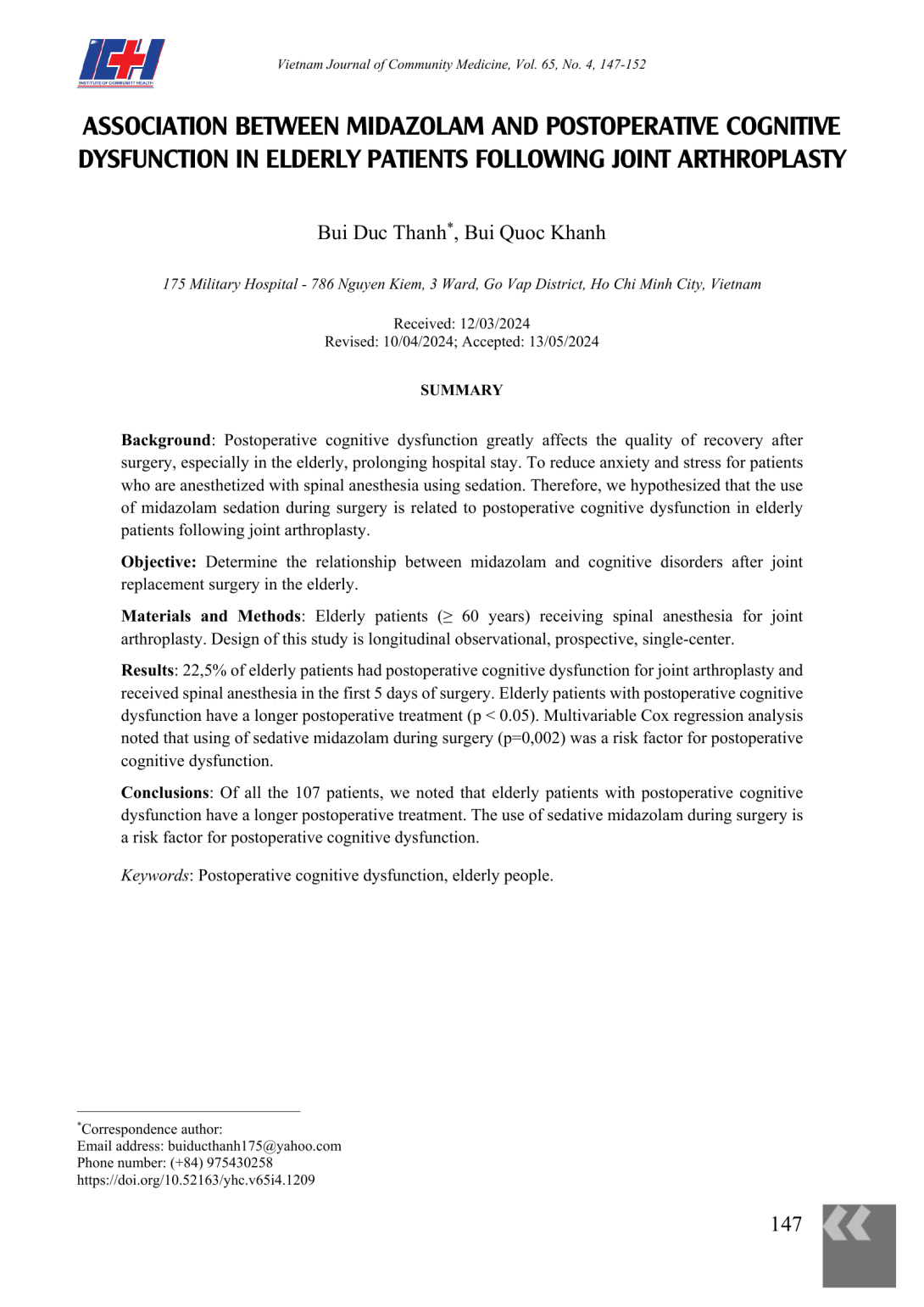
Rối loạn nhận thức sau phẫu thuật ảnh hưởng nhiều đến chất lượng hồi phục sau phẫu thuật, đặc biệt ở người cao tuổi làm kéo dài thời gian nằm viện. Để giảm lo âu, căng thẳng cho người bệnh được vô cảm bằng gây tê tủy sống trong phẫu thuật có sử dụng thuốc tiền mê. Do đó, chúng tôi đã đưa ra giả thuyết nghiên cứu sử dụng midazolam an thần trong phẫu thuật có liên quan đến rối loạn nhận thức sau phẫu thuật thay khớp ở người bệnh cao tuổi. Mục tiêu: Xác định mối liên quan midazolam và rối loạn nhận thức sau phẫu thuật thay khớp ở người cao tuổi. Đối tượng và phương pháp nghiên cứu: Người bệnh cao tuổi (≥ 60 tuổi) được gây tê tủy sống phẫu thuật chương trình thay khớp háng và khớp gối. Thiết kế nghiên cứu quan sát dọc, tiến cứu, đơn trung tâm. Kết quả: 22,5% người bệnh cao tuổi rối loạn nhận thức sau phẫu thuật chương trình thay khớp háng và khớp gối được gây tê tủy sống trong 5 ngày đầu phẫu thuật. Người bệnh rối loạn nhận thức sau phẫu thuật có thời gian nằm điều trị hậu phẫu dài hơn (p < 0,05). Phân tích hồi quy Cox đa biến ghi nhận người bệnh có sử dụng midazolam an thần trong phẫu thuật (p= 0,002) là yếu tố nguy cơ rối loạn nhận thức sau phẫu thuật. Kết luận: Nghiên cứu phân tích 107 người bệnh ghi nhận người cao tuổi có rối loạn nhận thức sau phẫu thuật làm kéo dài thời gian nằm điều trị hậu phẫu và sử dụng midazolam an thần trong phẫu thuật là yếu tố nguy cơ rối loạn nhận thức sau phẫu thuật.
Postoperative cognitive dysfunction greatly affects the quality of recovery after surgery, especially in the elderly, prolonging hospital stay. To reduce anxiety and stress for patients who are anesthetized with spinal anesthesia using sedation. Therefore, we hypothesized that the use of midazolam sedation during surgery is related to postoperative cognitive dysfunction in elderly patients following joint arthroplasty. Objective: Determine the relationship between midazolam and cognitive disorders after joint replacement surgery in the elderly. Materials and Methods: Elderly patients (≥ 60 years) receiving spinal anesthesia for joint arthroplasty. Design of this study is longitudinal observational, prospective, single-center. Results: 22,5% of elderly patients had postoperative cognitive dysfunction for joint arthroplasty and received spinal anesthesia in the first 5 days of surgery. Elderly patients with postoperative cognitive dysfunction have a longer postoperative treatment (p < 0.05). Multivariable Cox regression analysis noted that using of sedative midazolam during surgery (p=0,002) was a risk factor for postoperative cognitive dysfunction. Conclusions: Of all the 107 patients, we noted that elderly patients with postoperative cognitive dysfunction have a longer postoperative treatment. The use of sedative midazolam during surgery is a risk factor for postoperative cognitive dysfunction.
- Đăng nhập để gửi ý kiến
